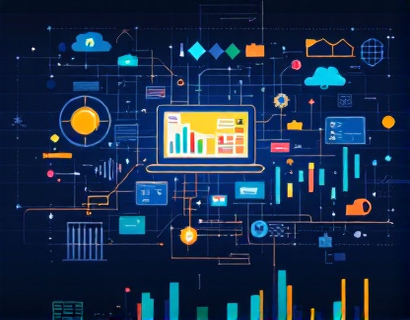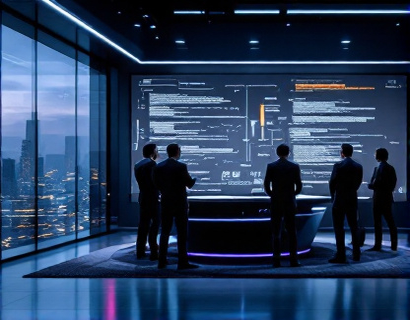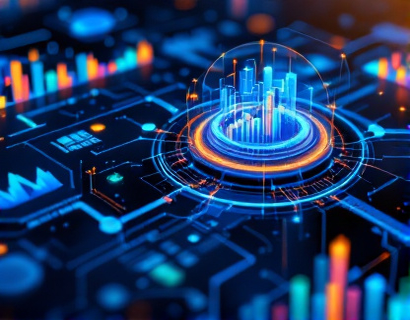Transforming Productivity with Next-Gen Digital Solutions: The Synergy of AI and Crypto
The integration of artificial intelligence (AI) and cryptocurrency is revolutionizing the way tech innovators and early adopters approach productivity in the modern workplace. This synergy is not just about adopting new technologies but redefining efficiency, task management, and digital interactions. As we delve into this transformative landscape, it's essential to understand how these cutting-edge solutions are reshaping the digital ecosystem to meet the demands of today's fast-paced environment.
The convergence of AI and cryptocurrency brings a unique set of advantages that traditional systems cannot match. AI's ability to process vast amounts of data quickly and accurately, combined with the decentralized and secure nature of blockchain technology, creates a powerful toolset for enhancing productivity. This article explores how these technologies are being leveraged to create next-generation digital solutions that maximize efficiency and streamline workflows.
Enhancing Task Management with AI
One of the most immediate impacts of AI in the workplace is in task management. AI-driven tools can analyze user behavior, predict workloads, and optimize task assignments. For instance, AI algorithms can identify patterns in how tasks are completed and suggest the most efficient sequences for multitasking. This not only saves time but also reduces the cognitive load on employees, allowing them to focus on higher-value tasks.
Project management platforms powered by AI can automate routine tasks such as scheduling meetings, setting reminders, and tracking progress. These platforms use natural language processing (NLP) to understand and respond to user commands, making interaction more intuitive and seamless. By automating mundane tasks, AI enables team members to concentrate on creative and strategic work, thereby boosting overall productivity.
Cryptocurrency and Decentralized Workflows
Cryptocurrency introduces a new paradigm for financial transactions within the workplace. Traditional payment systems are often slow, expensive, and prone to fraud. Cryptocurrency, on the other hand, offers a fast, secure, and transparent way to handle payments. Smart contracts on blockchain can automate payment processes based on predefined conditions, eliminating the need for intermediaries and reducing transaction costs.
Decentralized applications (dApps) built on blockchain technology can further enhance workflow efficiency. These dApps can provide a platform for collaborative work, where tasks and assets are managed in a transparent and tamper-proof manner. For example, a decentralized version of a cloud storage service can ensure that files are securely stored and accessible only to authorized users, without the risk of data breaches or loss.
AI-Driven Analytics and Insights
AI's capability to analyze large datasets provides invaluable insights that can drive decision-making and improve productivity. Advanced analytics tools can process data from various sources, including CRM systems, project management tools, and even social media, to provide a comprehensive view of business performance. These insights can help identify bottlenecks, optimize resource allocation, and forecast future trends.
Predictive analytics powered by AI can anticipate potential issues before they arise, allowing for proactive measures to be taken. For instance, AI can predict equipment failures in manufacturing processes, schedule maintenance, and minimize downtime. In the context of remote work, AI can analyze communication patterns and suggest improvements to team collaboration, ensuring that virtual teams remain productive and engaged.
Security and Privacy in AI and Crypto Solutions
Security and privacy are paramount when integrating AI and cryptocurrency into workplace solutions. Blockchain's inherent security features, such as immutability and decentralization, provide a robust framework for protecting sensitive data. AI can enhance security by detecting anomalies and potential threats in real-time, using machine learning algorithms to adapt to new types of attacks.
Privacy-preserving techniques like zero-knowledge proofs and homomorphic encryption ensure that data remains confidential while still being usable for AI computations. This allows organizations to leverage the power of AI without compromising on data security. By combining these technologies, businesses can create a secure and private digital environment that fosters trust and confidence among users.
User Experience and Accessibility
The success of AI and cryptocurrency solutions in the workplace depends significantly on user experience (UX) and accessibility. Intuitive interfaces and user-friendly designs are crucial for widespread adoption. AI can play a key role in personalizing the user experience, adapting to individual preferences and work styles. For example, AI-driven interfaces can learn from user interactions and suggest customizations that enhance usability.
Accessibility is another critical aspect. AI-powered tools can make digital solutions more accessible to users with disabilities. Voice recognition, text-to-speech, and other assistive technologies can ensure that everyone has equal access to these advanced tools. By focusing on inclusive design, organizations can create a more diverse and productive workforce.
Case Studies and Real-World Applications
Several companies have already begun to harness the power of AI and cryptocurrency to transform their operations. For instance, a leading software development firm implemented an AI-driven project management tool that integrated blockchain for secure and transparent task tracking. The result was a 30% increase in project completion rates and a significant reduction in miscommunications.
In the financial sector, a major bank adopted a cryptocurrency-based payment system for cross-border transactions. By using smart contracts, the bank reduced transaction times from days to minutes and cut costs by eliminating intermediaries. This not only improved efficiency but also enhanced customer satisfaction.
Challenges and Considerations
While the potential benefits are substantial, there are challenges and considerations that organizations must address when integrating AI and cryptocurrency solutions. One of the primary challenges is the technical complexity involved in implementing these technologies. Organizations need to invest in training and development to ensure their teams have the necessary skills.
Regulatory compliance is another critical factor. The regulatory landscape for cryptocurrency is still evolving, and organizations must navigate these changes carefully. Ensuring compliance with data protection laws and financial regulations is essential to avoid legal issues.
Additionally, there is a need for standardization in the industry to facilitate interoperability between different AI and cryptocurrency solutions. Without standard protocols, integration can be challenging, and the full potential of these technologies may not be realized.
Future Trends and Innovations
The future of AI and cryptocurrency in the workplace is promising, with several emerging trends and innovations on the horizon. One such trend is the integration of AI with the Internet of Things (IoT) to create smart work environments. AI can analyze data from IoT devices to optimize energy usage, enhance security, and improve overall workplace efficiency.
Another exciting development is the rise of decentralized finance (DeFi) applications in the corporate world. DeFi platforms can offer new ways for businesses to manage finances, raise capital, and conduct transactions without traditional financial institutions. This can democratize access to financial services and create more resilient economic systems.
Furthermore, the advancement of quantum computing could revolutionize AI capabilities, enabling even more complex and efficient computations. When combined with blockchain, quantum AI could solve problems that are currently intractable, opening up new possibilities for productivity and innovation.
In conclusion, the integration of AI and cryptocurrency is transforming productivity in the modern workplace. By leveraging these technologies, organizations can achieve higher efficiency, better task management, and enhanced security. As the landscape continues to evolve, staying informed and adaptable will be key to harnessing the full potential of these next-generation digital solutions.











































